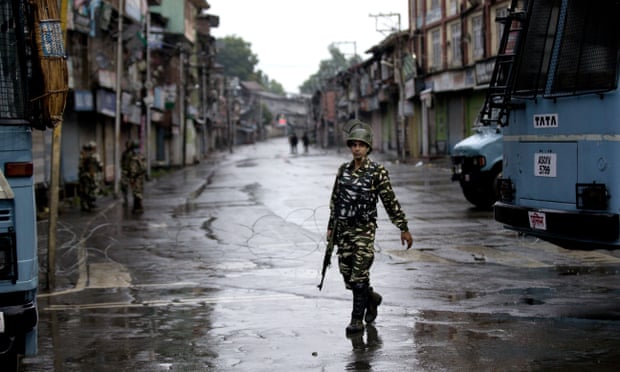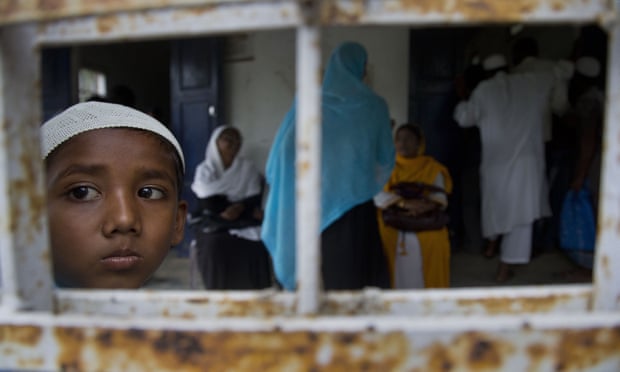- UID
- 20
- Online time
- Hours
- Posts
- Reg time
- 24-8-2017
- Last login
- 1-1-1970
|
|
━━━━━━━━━━━━━━━━━
Modi’s vision for the country is one that stifles dissent and difference, in defiance of its people’s history.

‘There is the impression that not just the Kashmiris’ but all our fates are now being decided for us.’ Indian security personnel in Srinagar, Kashmir. Photograph: Dar Yasin/AP
▼ Four months have passed since Narendra Modi and the BJP came back to power in India, and more seems to have happened there than in the last 40 years. The sense of severancethat many experience today, of being divorced from the workings of the nation, exceeds even the helplessness felt during the suspension of civil libertiesin the emergency of 1975 to 1977 and the political traumas that followed.
This is because – without the matter being explicitly articulated – citizen has been set against citizen: not just Muslim against Hindu or, say, Kashmiris against the rest of India, but those who subscribe to the BJP’s new conception of the nation against those who do not, leaving one without trust in the other.Indian parties are only democrats when in opposition. But no government has been as punitive towards dissent as this
How to judge these past four months? A series of disruptions has dwarfed the now distant seeming upset of Modi’s economically disastrous demonetisationprogramme of 2016. In August there was the abrogation of article 370of the Indian constitution, which granted “special status” to Kashmir in acknowledgment of its contested history. This was followed immediately by the “house arrest” of elected Kashmiri leaders and the imprisonment of thousands of others.
What we saw was the attempt to take a difficult and divisive issue and simply place it to one side by act of will, so that it requires no further discussion. There is the impression that not just the Kashmiris’ but all our fates are now being decided for us.
The home minister, Amit Shah, would have us believe that the “restrictions’” in Kashmir are all in the mind. I asked a Kashmiri how she interpreted this. She speculated that what was being implied was that the lack of protest in Kashmir was equal to normalcy. But a lack of protest in a democratic country is strange, and a sustained lack of protest alarming. Is this the normalcy that Indians wish to be bestowed on them by their government?
Then there is spectacle of a different sort: of the government borrowing an unprecedented sum of money from the Reserve Bank of India; of it failing to pay the Central Reserve Police Force; of the economy tanking, of Modi pronouncing that India is in the ascendant. We live simultaneously in disparate realities: a “normal” Kashmir, an abnormal country; a bankrupt economy; a rising India – competing scripts, none of which acknowledge the existence of the other, as distant as countryman has grown to countryman.
If asked what this government’s one great recent achievement is, some people might draw attention to the number of toiletsbuilt in a country with poor sanitation. Others, whose experience of the new India is different, would say that its greatest success has been in creating a climate of fear. As a consequence, dissent has a purer form now. It’s no longer, as it was once, preaching to the converted. It’s not even the pointing out of unpleasant facts. It’s simply a demonstration that dissent continues to be possible.
India has not, outside of Indira Gandhi’s declaration of emergency, been in this place before, and certainly not with the degree of popular support we see now, which can only be characterised as a form of inebriation. The judiciary, the police and other law enforcement agencies are all seen, rightly or wrongly, to “belong” to the government, and many high-profile lawbreakers seem to be those who, coincidentally, disagree with the BJP. The number of cases of “sedition”, a charge left over from colonial India, has risen dramatically.

‘The National Register of Citizens is a BJP-backed project aimed at uncovering foreigners’.’ Villagers wait to check their names in the register in Assam. Photograph: Anupam Nath/AP
Of course, the erosion of institutional independence didn’t happen overnight. Over the last 30 years all governments in India, state and central, have had limited respect for civil liberties and democracy: (▪ ▪ ▪)
► Please, continue reading this article here: Source |
|